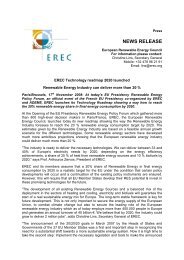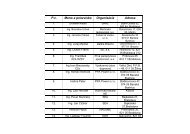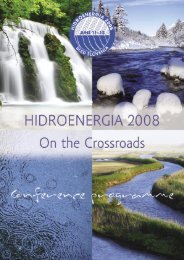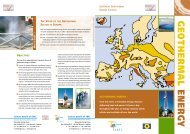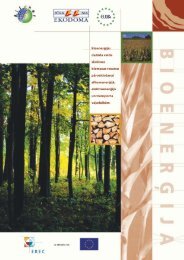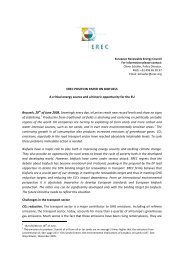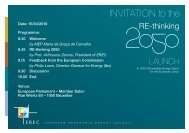CTO Assessment - European Commission
CTO Assessment - European Commission
CTO Assessment - European Commission
Create successful ePaper yourself
Turn your PDF publications into a flip-book with our unique Google optimized e-Paper software.
The following actions were the core<br />
of the Campaign for Take-Off:<br />
<strong>CTO</strong> Renewable Energy Partnership:<br />
the major tool to reach <strong>CTO</strong> objectives<br />
The Renewable Energy Partnership<br />
has been developed to involve key<br />
actors in the Campaign. A Renewable<br />
Energy Partnership also strengthens<br />
the necessary co-operation at Community<br />
level.<br />
Though not entailing legally binding<br />
obligations, joining the Partnership<br />
required strong commitment and a<br />
substantial contribution to the objec-<br />
tives of the <strong>CTO</strong>. Joining proceeded<br />
through a Declaration whereby the institution,<br />
organisation or company in<br />
question stated its willingness to contribute<br />
to the <strong>CTO</strong> and described the<br />
substance of its contribution.<br />
Depending on the nature of the Partner,<br />
contributions may have taken the<br />
form of investment or promotional programmes<br />
in the key renewable energy<br />
sectors forming part of the Campaign,<br />
or other support measures aimed at<br />
raising interest among industry, investors<br />
and the public and increasing<br />
the market penetration of RES.<br />
Eligibility criteria:<br />
In principle, every institution, company or organisation, both<br />
public and private, that contributed to the Campaign had the<br />
possibility to join the Partnership. Administrative procedures<br />
and guidelines were such as to allow a wide membership of<br />
serious contributors to the Campaign.<br />
However, in order to maintain the credibility of the Partnership,<br />
the following criteria have been followed:<br />
General guidelines:<br />
1. The “programme” put forward had to focus on RES, exclusively<br />
or partly, and on the key sectors of the <strong>CTO</strong>.<br />
2. The “programme” had to be approved and launched or at<br />
least a deadline for launching fixed.<br />
3. Although size was not a determining factor, the “programme”<br />
should have nevertheless made a substantial local, regional,<br />
national or international impact.<br />
4. The “programme” had to be proposed by the main promoter.<br />
The “promoter” could be municipalities, regional or national<br />
authorities, private organisations, associations or companies<br />
or a group of them.<br />
5. The Partnership “promoters” had to submit a detailed description<br />
of the “programme” they wished to propose as a<br />
contribution to the Campaign. From this description it must<br />
have been clear that the planned actions fulfilled the criteria<br />
contained in the guidelines.<br />
<strong>CTO</strong> RENEWABLE ENERGY PARTNERSHIP<br />
6. As regards the verification of whether the declared projects<br />
in fact materialised, a reporting requirement (relatively light)<br />
was foreseen for the “promoters”.<br />
7. Compliance with Community, national and local regulations<br />
were compulsory for any action and project to be undertaken in<br />
the framework of the “programme”.<br />
Partnership proposals submitted directly to the <strong>Commission</strong>:<br />
Proposals for a RE Partnership arriving directly to the <strong>Commission</strong><br />
were assessed and approved or rejected according to<br />
the principles agreed (guidelines see above).<br />
The <strong>Commission</strong> sent new RE Partnership candidates lists to<br />
MS representatives in the RES Working Group. The lists were<br />
updated on a regular basis (six months).<br />
Participation:<br />
During the period 2000-2003, 125 renewable energy programmes<br />
and projects involving more than 700 partner organizations in<br />
the <strong>European</strong> Union – municipalities, agencies, technological institutes,<br />
regional authorities, national institutions, universities<br />
and enterprises – joined the Campaign as Renewable Energy Partners<br />
and thereby expressed openly their willingness to contribute<br />
to its objectives. Organisations and authorities from the Accession<br />
Countries joined the Campaign at an early stage with successful<br />
initiatives at local level or through joint initiatives with<br />
other <strong>European</strong> Union organizations.<br />
Industry<br />
National<br />
Promotion<br />
Regional<br />
Local communities<br />
Developing Countries<br />
100% Communities<br />
3%<br />
5%<br />
10%<br />
13%<br />
16%<br />
25%<br />
28%<br />
0% 5% 10% 15% 20% 25% 30%<br />
8<br />
The Campaign



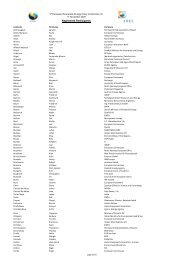
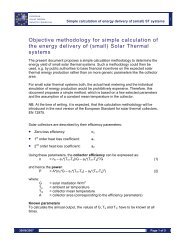
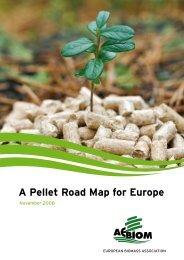
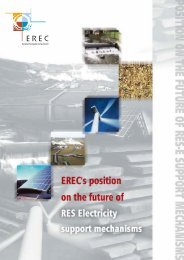
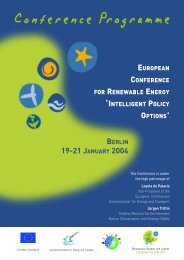
![Energy [R]evolution - Greenpeace](https://img.yumpu.com/47174859/1/184x260/energy-revolution-greenpeace.jpg?quality=85)
